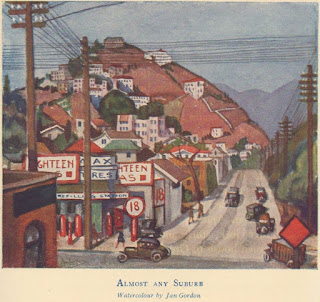The Serving Maid's Thumb, a 1923 story by Jan Gordon
A century ago, Jan Gordon published an entertaining short story set in a Parisian cafe. It's in Blackwoods, volume 213, pg. 362-387. The story is about a serving maid who had cut her thumb, roughly bandaged it and cheerfully continued with her duties. Gordon paints a vivid word picture of the cafe, its patron and his Madame, the characters of the various customers and contrasts the experience of dining in London and Paris. He also weaves in elements of his experience in Serbia during the First World War.
It begins with, “The girl had hurt her thumb and had it tied up in a piece of rag which had already become soiled and grimy from contact with the dishes." She carried the plates coiled in her left arm and handed them out with her uninjured left hand. "She ran happily to and fro, now slicing a piece of bread from the metre-long French roll, which stood in its tall basket ; now seizing a chopine of red or white wine from the “zinc” ; now crying an order to the kitchen at the back - where Madame performed miracles of comprehensive cooking on a tiny range ; now totting up a score, handling the pencil clumsily in her bandaged thumb."
A dozen diners including Jan and Cora Gordon, were seated at the long table with a group of three men, one fattish with wrinkles of jollity around his eyes, humming loudly between courses; one red-haired with a serious, set face; and one "small and excitable with protuberant eyes and cheekbones, his sleek black hair covered by a bowler hat, rather small and set askew."
Gordon reported on the conversations taking place in the small coachman’s restaurant, including “I say that every country has its own kind of sheep-dog” stated by a women who was repeatedly ignored by the rest of the company.
From time to time a passerby came in to lean on the zinc and drink one of those “strange pre-dinner drinks of Paris, a gentian with lemon syrup, or a tar and black-currant."
The patron in a waistcoat of loud check stood to greet and wish farewell to each of the customers, “advancing to offer his plump palm to the habitual dinner guest.” The patron would grab a cloth and “industriously rub any hint of dimness from the brilliant polish of his white-metal top.”
Jan Gordon comments that in London, you wolf, you feed, you eat, you sup, or you dine according to the bill to be settled. In Paris however, no matter where you take your meal, you dine. After more musing along these lines, he returns to the various conversations taking place.
When Jan and Cora decide to leave, the maid performs l’addition and Cora notes that she has hurt her thumb. The maid says it's just a small cut which has swollen a little. Cora recommends that she dips it in hot water to relieve the inflammation and at this point the man with the goggle eyes and bowler hat joins in with insistent and melodramatic assertions about it being a whitlow, blood poisoning and then the fat man adds the story that a friend of his had had to have his arm cut off at the shoulder after three days. Madame joined in, making a pantomime of putting the thumb in hot water.
Cora Gordon then advised some iodine in the water, but when contradicted by the man in the bowler hat and Madame, she became insistent: "When I worked in a hospital during the war," said my wife suddenly and with great firmness, "we put iodine into the water."
The man in the bowler hat then tells the increasingly silent and nervous serving maid that she may have tetanus and, luridly, that the wife of a friend of his died of tetanus. The fat man continued to repeat his story of the amputation and Jan and Cora Gordon engineered their escape, "we had seized our moment at the beginning of the jolly man's reiteration ; and at this moment he had to interrupt himself and to stand up so that we could pass behind him, for one sits at close quarters in these café-zincs."
The story ends with the sounds of the poor serving maid plunging her thumb into a cup of scolding water unable to endure all the melodramatic predictions about the consequences of the wound to her thumb.
This tale uses the experience of the Gordons in Paris and their experience with the Red Cross during the First World War in Serbia to good effect. My grandparents, Doris and Ashley Smith accompanied Jan and Cora to one of these simple restaurants and were not impressed, commenting on the "fat soup". On another occasion, Doris and Ashley had met a poet friend of the Gordons, Fritz Vanderpyl, in Paris restaurant, on the 30th March 1923. Again, they were not impressed.




Comments
Post a Comment